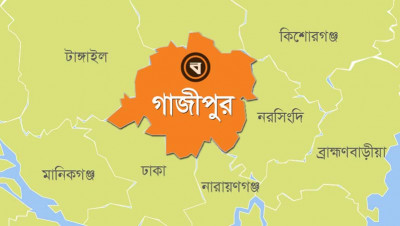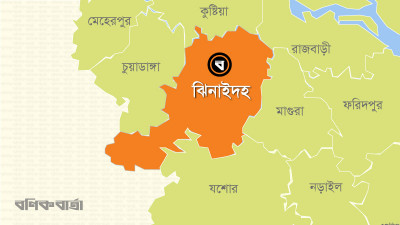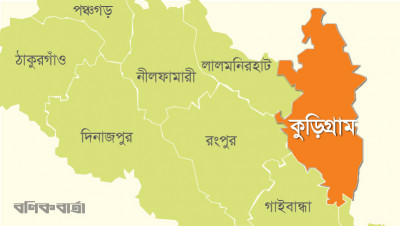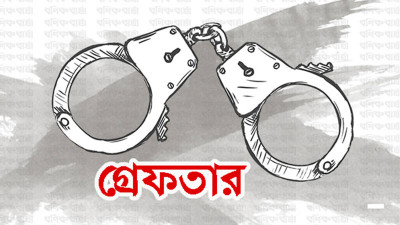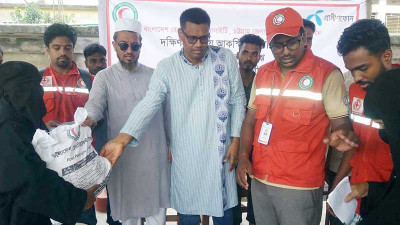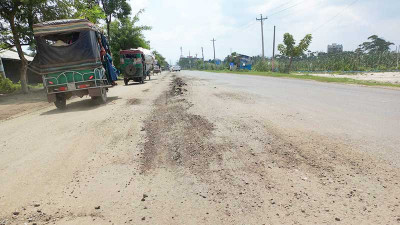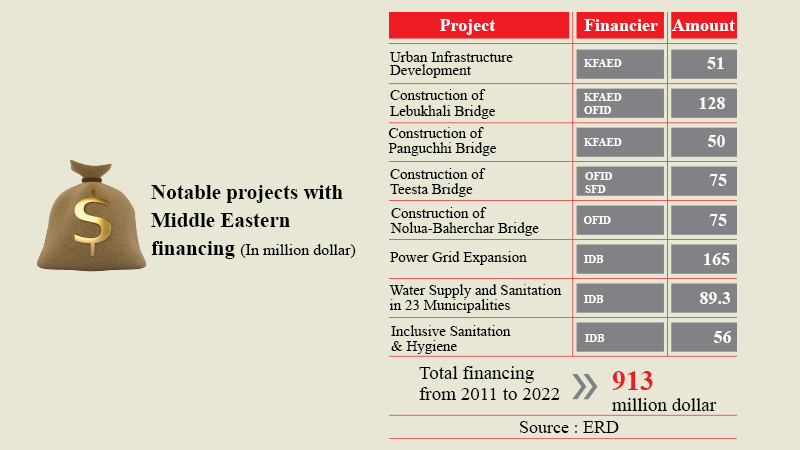 Bonik Barta graph
Bonik Barta graph Since the independence, Bangladesh has placed emphasis on
gradual improvement of bilateral relations with the Middle Eastern countries as
development partners. Particularly, there was an added importance after
Bangladesh started sending workforce to the Middle Eastern nations in the
1980s. However, the countries belonging to the region has not yet played any
major role in Bangladesh’s development journey, especially investment in
infrastructure projects. According to information available from Economic
Relations Division (ERD), the amount Bangladesh received from these countries
as loan assistance in last twelve years was less than a billion dollar.
A loan agreement was signed with Saudi Arabia in February,
2011 with regard to the construction of the third Shitalakkhya Bridge in
Narayanganj at a cost of $45 million. Loan assistance of $128 million came from
Middle East for the construction of a bridge over Pyra River at Lebukhali on
Barisal-Patuakhali highway. Of the amount Kuwait contributed $98 million and
OPEC Fund for International Development (OFID) provided the remaining $30
million. With these two projects, the total amount received from Middle Eastern
Arab countries and organizations in different development projects in last twelve
years (till 2022-23 fiscal year) stood at little over $913 million.
Alongside financing, the release of pledged money from these
country has also gone down. As per latest ERD information, these country
released a sum of $47 million in first eight months (July-February) of the
current 2023-24 fiscal year. It is expected that $116 million will be released
in the current fiscal. During the same period of previous fiscal (2022-23) $62
million was financed.
Almost each of the Middle Eastern countries has sound funds
for financing and investing in Muslim-majority developing countries like
Bangladesh. But, investment from those funds could not be attracted in
Bangladesh. About the reasons, analysts believe that investment environment and
potentials could not be attractively presented before them. Effective programs
must be undertaken in this regard.
Shedding light on the issue, former State Minister for Planning
Dr Shamsul Alam told Bonik Barta, “There are huge funds in the Middle Eastern
countries. Political relations need to be strengthened to attract investment
from these funds. In addition, seminars, symposiums and discussions will have
to be organized. The investment climate will have to be upgraded to meet their
needs. If necessary, special economic zones will have to be established for
them. In coming days, we will need multifaceted investment. Therefore, proper
branding is necessary alongside publicizing the potentials of the country. Foreign
Ministry, Commerce Ministry and ERD have to take concerted initiatives.”
Saudi Arabia is the largest economy in the Middle East. The oil-rich
nation finances in Bangladesh through Saudi Fund for Development (SFD). Other
countries of the region also have established quite a few such funds for
financing and investment. For Instance, Kuwait finances through Kuwait Fund for
Arab Economic Development (KFAED). Arab countries belonging to OPEC have
jointly established OFID. Besides, Islamic Development Bank (IDB) provides loan
assistance on behalf of different countries. ERD information say that through
these four organizations, Bangladesh received investment worth $913 million
from the Middle East in last 12 years. Loans from these organizations were
available for small projects, but there was no luck with respect to big
projects.
So far, Bangladesh received the maximum amount of loan from
IDB in a development project -- $165 million. IDB signed an agreement in 2014
on the finance in a project to expand power transmission grid. In 2015, the
organization inked a deal with the Health and Family Welfare Ministry for a
grant of $30 million for improvement of rural health. In the same year, the
Local Government Engineering Department (LGED) signed a loan agreement with IDB
for the upgrading of rural roads. That year also saw the signing of a loan
agreement of $50 million between Bangladesh and OFID for the construction of a
bridge over Teesta River. Saudi Arabia provided a loan of $30 million through
SFD to set up a burn and plastic surgery unit in 2017. In the same year, IDB
gave loans of $132 million for two separate projects on water supply and
agriculture.
Kuwait provided a loan of $51 million through KFAED in 2018
for the development of urban infrastructures. In 2021, the rich Gulf nation
inked a loan agreement worth $50 million for the construction of Panguchhi Bridge.
In the same year, Bangladesh signed deal with OPEC fund for a loan of $75
million for the construction of Nolua-Baherchar Bridge. Bangladesh received an
IDB loan of $47 million, also in 2021, for the development of SME sector. The
Jeddah-based bank signed a deal to provide a loan of $56 million in 2022 in the
field of sanitation.
According to seasoned diplomats, Bangladesh receives
negligible amount of loan from Middle East. Qatar and United Arab Emirates (UAE)
have huge financing in neighboring India. UAE has recently announced that it
will invest a staggering $75 billion in India. Middle East has some perception
about Bangladesh. Middle East still regards Bangladesh as a country that
supplies cheap and unskilled workers. They do not have a clear idea about
Bangladesh’s economic development and its investment potentials. And,
Bangladesh is not seen consistent in its efforts to change the perception. The
country also lacks in developing the relationship in line with the recent
socioeconomic transformation in Middle East. Next door neighbor India, however,
advanced the relationship with the Middle Eastern countries realizing all those
issues.
“Our diplomacy must be made professional. Remaining only
labor-centric will not help. To tap the trade and investment potentials,
high-level diplomatic professionalism is imperative. Skills in this regard
should be enhanced,” former Ambassador Humayun Kabir told Bonik Barta.
“The diplomats concerned should enhance their skill in Arabic
language which is essential to publicize investment. All in all, Bangladesh
will have to be attentive in advancing the relations with the Middle Eastern
countries understanding the changes in the regions, including economy,”
Among the Middle Eastern countries, Saudi Arabia leads the way
when it comes to financing in Bangladesh. From Bangladesh’s independence till
2022-23 fiscal year, Saudi Arabia financed $1.097 billion in Bangladesh. Of the
amount, $587 million came as grant. During the same period, IDB provided $1.399
billion.
According to diplomatic sources, there have been discussions
for a long time about the visit of Saudi Crown Prince Mohammed bin Salman to
Bangladesh. But, Bangladesh cannot prepare any project proposals to be presented
before him. Saudi Arabia is interested in starting some projects in Bangladesh.
There were some project proposals from UAE as well. But, those are now stuck in
bureaucratic complexities. The country is little prepared in utilizing the
economic power of the Middle East.
“Viewpoint is an issue when it comes to get money from Middle
East. Countries in that region still consider Bangladesh a cheap labor-supplying
country. They are yet to know that Bangladesh is an emerging economic power and
we cannot keep them informed about our economic consistency,” immediate-past
Foreign Minister and current Chair of the Parliamentary Standing Committee on
Ministry of Foreign Affairs Dr AK Abdul Momen told Bonik Barta.
“Maybe, they do not believe what we say. Middle Eastern
countries are not interested in investing and financing in Bangladesh. Those
who wanted to invest have lost interest due to bureaucratic complicacies,”
Diplomats concerned, however, claim that diplomatic
communications are now being strengthened with the Middle Eastern countries. As
a result, top leaders from those countries are getting interested to visit
Bangladesh. Qatari Amir Sheikh Tamim bin Hamad Al Thani is scheduled to arrive
in Bangladesh on April 22 on two-day visit. Alongside cooperation in energy
sector, issues related to recruitment of Bangladeshi skilled workforce and
expansion of trade will get prominence at the talks during his visit.
When contacted, Chair of the Standing Committee on Ministry of
Planning MA Mannan told Bonik Barta, “Different initiatives are being taken to
encourage the Middle Eastern countries. But, they will not invest if they
cannot do business. Besides, they are more focused on Africa. They are
investing more in Africa.”
“The Middle Eastern countries are not helping us much in
constructing hospitals, schools and roads in our country. They are giving us
loans through IDB, but it depends on conditions of loans, interest rates and
discussions. Overall, Middle East could not yet be a significant source of loan
financing for us,” he said.

